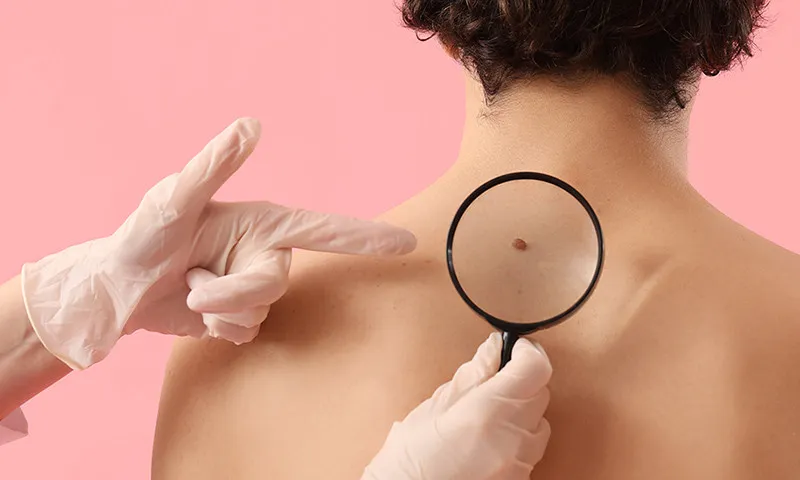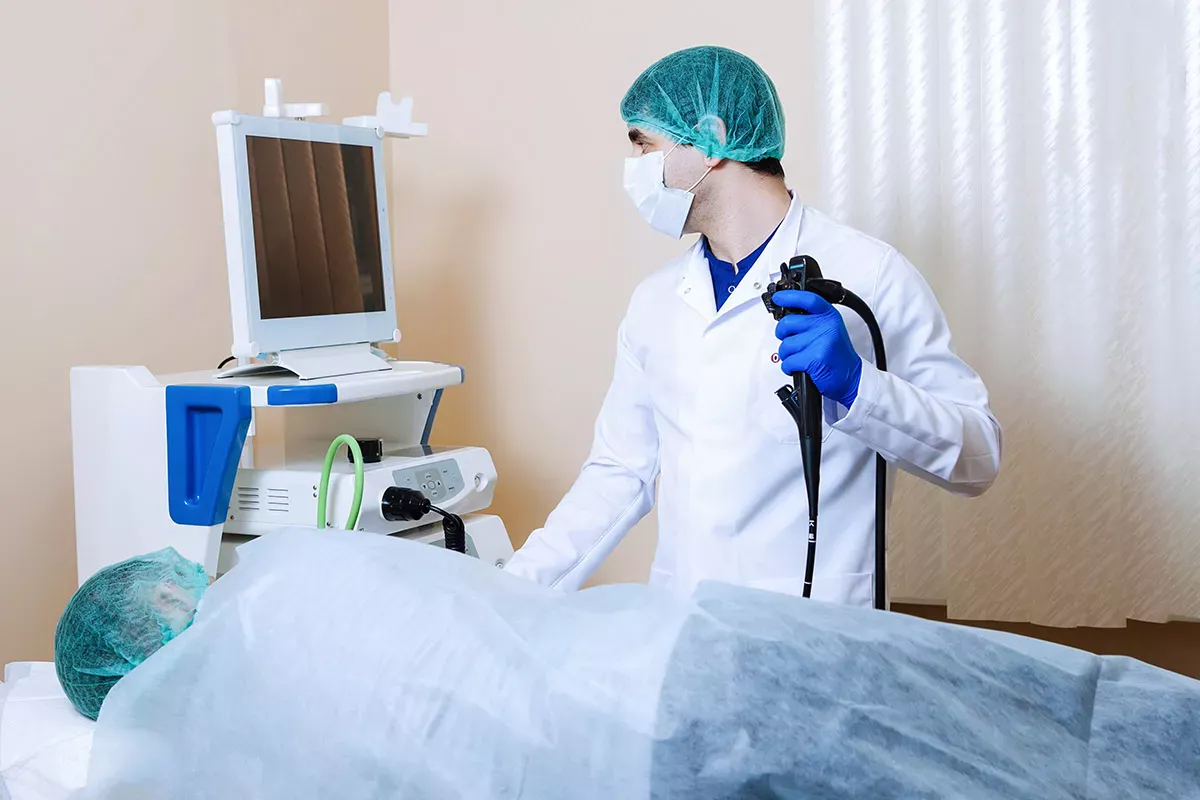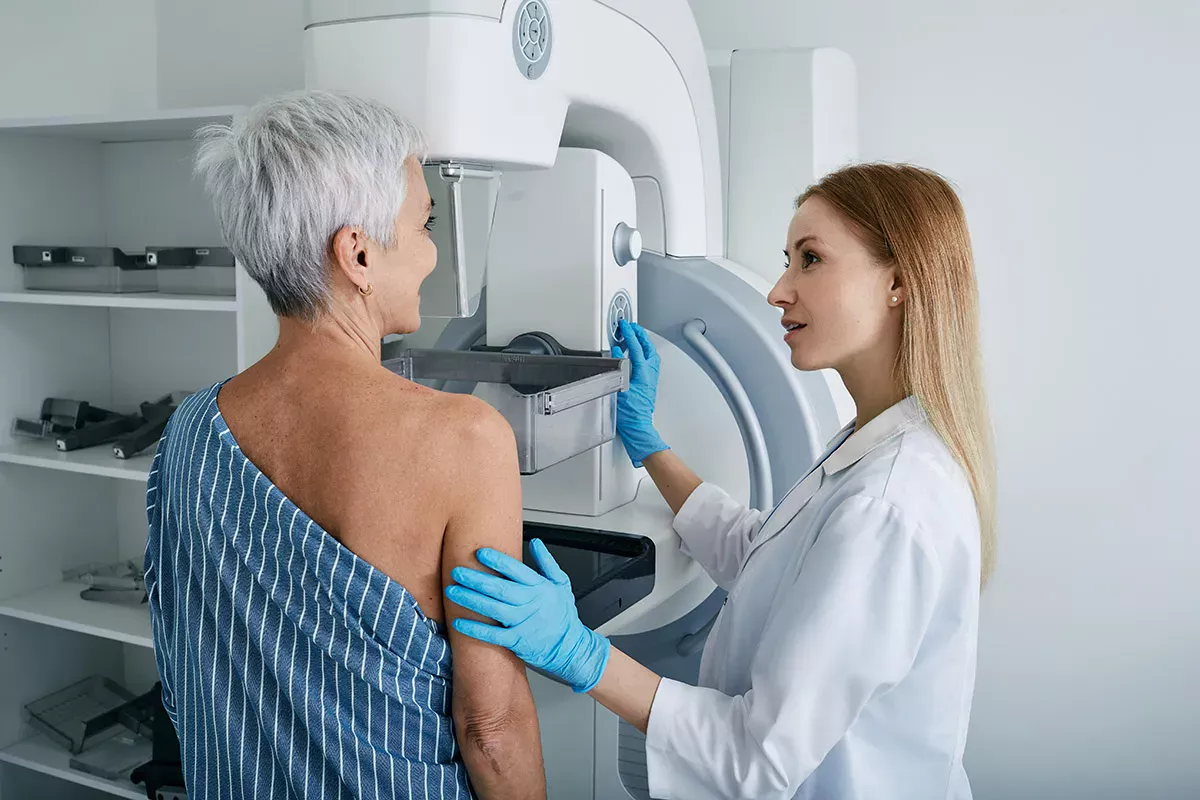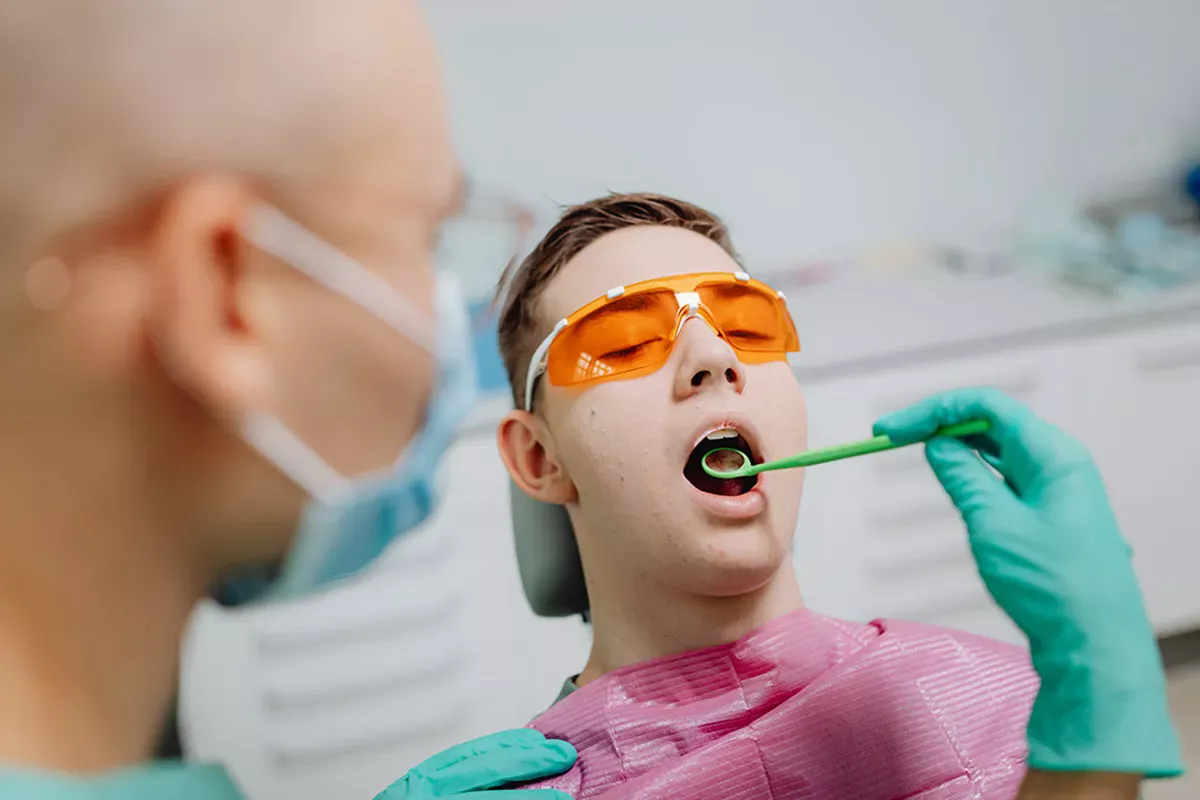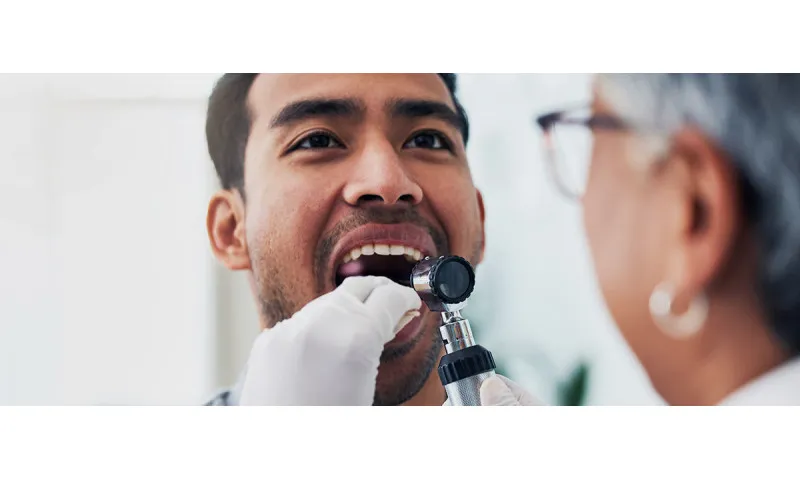What is cancer screening?
In common parlance, the term "cancer screening" is used for all examinations that aim to detect cancer at an early stage and increase the chances of recovery accordingly. In specialist circles, however, the term has a more specific meaning: when doctors talk about cancer prevention, they are referring specifically to cases in which the development of cancer can be prevented - for example, when precancerous stages of cancer can be detected and removed before a tumour can form. However, this is currently only possible for bowel cancer, cervical cancer and some forms of skin cancer. In the medical world, the term "early cancer detection" is used when the aim of the examination is to detect tumours at the earliest possible stage. In this article, for the sake of simplicity, we will use the term "cancer screening" for both concepts, as it is also used in common parlance.
Why is cancer screening important?
The earlier a tumour is detected, the better the chances of recovery - this applies to every type of cancer. As many cancers cause no or only very mild symptoms in the early stages, tumours often remain undetected for a long time and may have already spread to other parts of the body (this is also known as metastasis), which greatly reduces the chances of recovery. The guideline on early cancer detection aims to prevent this by recommending that patients should be examined by experts at regular intervals. There is already very good evidence of success for cervical cancer and bowel cancer.
Criticism of cancer screening
However, there is also criticism of cancer screening for breast cancer, prostate cancer and skin cancer: Cancer screening examinations cannot guarantee 100 per cent certainty. This can lead to "false-positive" or "false-negative" findings. In the case of a "false-negative" finding, no tumour is detected during the cancer screening examination, even though the patient has cancer. In the case of a "false-positive" finding, there is a false suspicion of cancer that is not actually present. Patients with a "false-positive" result experience a very heavy psychological burden and are sometimes treated unnecessarily.
The problem is that even if a tumour is discovered in its early stages, experts usually cannot say for sure whether it will develop into a life-threatening disease or not. This is because there are precursors and also some tumours that can be lived with for a long time without treatment. According to the German Cancer Society, for every woman who is saved from dying of breast cancer, ten other women are overdiagnosed and overtreated. Overtreatment is a huge burden on the body, as cancer treatment has numerous side effects. For this reason, the German Cancer Research Centre expressly points out that the advantages and disadvantages should be weighed up carefully before undergoing cancer screening.
Good to know:
Did you know that both chemotherapy and radiotherapy have a major impact on oral health? Read our article to find out what side effects you can expect and how to protect yourself against them:
How to protect your teeth from the side effects of chemotherapy and radiotherapy
What cancer screening examinations are available?
The cancer screening guideline for Germany specifies which screening tests are to be covered by the statutory health insurance funds. The following five types of cancer are included in cancer screening:
- Skin cancer
- Colorectal cancer
- Breast cancer
- Cervical cancer
- Prostate cancer
Where do you have a cancer screening examination and what is done?
The doctor who carries out the examination depends on the type of cancer being sought:
Skin cancer screening by your family doctor or dermatologist
Cancer screening for skin cancer can be carried out either by a specially trained GP or a dermatologist. The skin on your entire body and head will be thoroughly examined for black and white skin cancer. How often you should go to the dermatologist for a cancer check-up has been laid down in the guidelines: every two years.
Good to know:
Lip cancer can be a form of skin cancer. You can find all the important information here:
Colorectal cancer screening by your family doctor, gynaecologist or gastroenterologist
From the age of 50, men and women are entitled to an annual stool test to check for invisible blood in the stool. You can have this stool test done either by your family doctor or gynaecologist.
Men over 50 and women over 55 are invited to have a colonoscopy, which is carried out by a gastroenterologist. The advantage: colonoscopy is more reliable than a faecal test. During a colonoscopy, the entire colon is examined using a mirror. In the event of suspicious findings, precancerous lesions can be removed directly. The colonoscopy can be repeated once after ten years. If you decide not to have a colonoscopy, you can continue to have a stool test every two years.
Cervical cancer screening: Smear test at the gynaecologist
Cervical cancer screening examinations are carried out by a gynaecologist. The doctor first examines the outside and inside of the genitals and then takes a smear from the cervix and uterine orifice (Pap test). If you have heavy bleeding during your period this examination at the gynaecologist's is not possible.
The Pap test can be used to detect cervical cancer and its precursors in a microscopic analysis. Women between 20 and 34 should have this examination every year. From the age of 35, women only have to undergo cervical cancer screening every 3 years. In addition to the Pap test, women are also tested for human papillomavirus (HPV). If the results are abnormal, the patient is informed immediately and invited for a further examination.
Good to know:
Human papillomaviruses (HPV) are extremely widespread and often harmless. However, they can also cause cervical cancer. Here you will find everything you need to know:
Breast cancer screening for women: What is done?
Parallel to cervical cancer screening, breast cancer screening is also carried out by the gynaecologist. The doctor palpates the breasts and armpits and examines them for hardening and enlarged lymph nodes. Women are also taught how to palpate their breasts themselves. This examination is recommended once a year from the age of 30.
Women between the ages of 50 and 69 can undergo a mammogram every two years. They are invited to do so in writing. A mammogram is an X-ray examination of the breasts that can detect both benign and malignant changes as well as precancerous lesions. In order to minimise false positive diagnoses, the X-ray images are reviewed by two specialists. If there are any abnormal findings, patients are invited for a further examination.
Prostate cancer screening by a urologist or family doctor
From the age of 45, men should have an annual cancer screening examination by either their GP or urologist. The urologist will first palpate the genitals from the outside. This is followed by a "digital rectal examination" of the prostate from the rectum. The "digital" does not refer to electronic data processing, but to the doctor's finger (from the Latin "digitus"), which palpates the prostate through the anus. A blood test is usually also carried out.
Costs: What does the health insurance fund pay?
The costs of all of the above examinations by a gynaecologist, dermatologist, urologist or GP are covered by statutory health insurance. Privately insured patients are also entitled to these examinations and - depending on the tariff - can often enjoy additional services that those with statutory insurance have to pay for themselves. In addition, privately insured patients do not usually have to adhere to the age requirements, but can often have the check-ups earlier.
Important for cancer screening at the gynaecologist: Ultrasound examinations are not part of the early detection guideline. Patients with statutory health insurance in Germany generally have to pay for this examination themselves.
Is there a cancer screening test for the lungs?
There is currently no legally recommended cancer screening for lung cancer in Germany - even though there is clear evidence that the chances of recovery are much better if a tumour is detected early. One reason for this is that blood tests and analyses of sputum when coughing are not reliable enough. On the other hand, CT examinations show a high number of false-positive findings: According to the German Cancer Society, 320 CT screenings would have to be carried out to prevent death from lung cancer.
Is there a whole-body cancer screening programme?
Yes, some clinics and doctors' surgeries offer a whole-body scan for cancer screening. With magnetic resonance imaging (MRI), the entire body is examined for tumours: all organs, the skeletal system, the spine, the vascular system and all larger joints. In contrast to X-rays, an MRI does not produce any harmful radiation. However, the whole-body check has one disadvantage: the costs are generally not covered by statutory health insurance. Private health insurance companies may cover a portion of the costs. It is therefore essential that you find out about the costs in advance if you are considering a full-body MRI.
Overview: Cancer screening for women
When should women start going for cancer screening? To help you keep track, we have summarised here which screening tests are due when for women.
Cancer screening for women aged 20 and over
Once a year you should go to the gynaecologist for cancer screening and have a smear taken from the uterus and cervix (Pap test).
Cancer screening for women over 30
Alongside the Pap test, you should now have your breasts palpated once a year.
Cancer screening for women over 35
From the age of 35, the annual Pap test is no longer required and is replaced by a combination of Pap test and HPV test every three years. In addition, you should now go for a skin cancer screening every two years. The annual breast examination remains the same.
Cancer screening for women over 50
You will be invited to have a mammogram, which you can repeat every two years. For bowel cancer screening, you should give a stool sample every year. From the age of 55, you are entitled to a colonoscopy, which you can repeat once every ten years. Alternatively, you can have a stool test every two years.
Cancer screening for women over 70
Mammography screening every two years will be cancelled. However, from 1 July 2024, you can continue to take part in mammography examinations until you are 75 years old. However, you will no longer be invited but will have to register yourself. The stool tests every two years will remain.
Cancer prevention during pregnancy and after the birth
If you have not yet had a cancer screening examination in the year of pregnancy, you can easily have it carried out at your first antenatal check-up. After the birth, you can go for a cancer screening again after about six to eight weeks.
Good to know:
Did you know that pregnancy can have an impact on your dental health? Find out what you need to look out for here:
Overview: Cancer screening for men
When should men start going for cancer screening? Men can take their time with cancer screening. There are no recommended cancer screening examinations for men from 20 and men from 30. It only starts at 35:
Cancer screening for men over 35
Have your whole body checked for skin cancer every two years by your GP or dermatologist.
Cancer screening for men over 45
From the age of 45, in addition to skin cancer screening, an annual visit to the urologist or family doctor for a prostate examination is recommended.
Cancer screening for men over 50
In addition to prostate and skin examinations, bowel cancer screening is now also on the agenda. You can either have a colonoscopy (which is repeated once after ten years) or have an annual stool sample tested for invisible blood in the stool. From the age of 55, the stool sample is taken every two years.
Cancer screening at the dentist
Although regular check-ups at the dentist are not an official part of the statutory cancer prevention programme, they are nevertheless extremely important: the dentist not only looks for tooth and gum diseases such as caries and periodontitis, but also thoroughly examines the oral mucosa.
If changes such as non-healing inflammation, hardening and red or non-wipeable white patches (Leukoplakia) occur, it should always be clarified what is behind this. It could already be a preliminary stage of oral cavity cancer. With this type of cancer, tumours develop slowly over several months or even years and do not initially cause any pain. This is why they are often not even noticed by those affected. It is therefore all the more important to have the oral cavity inspected regularly. This is because the chances of curing oral cavity cancer are significantly better if it is detected early.
If your dentist finds something suspicious, they can either take a tissue sample themselves and have it analysed in the laboratory or refer you directly to a specialist - for example an ENT doctor or oral surgeon. If you notice a suspicious area in your mouth yourself, you should definitely go to the dentist and have it checked out.
Good to know:
Every year, around 10,000 people in Germany are diagnosed with oral cavity cancer - the risk is particularly high among smokers. In our article, you can find out what exactly oral cavity cancer is, how it develops and what the treatment looks like:
Preventing cancer: 10 tips for reducing the risk of cancer
A cancer diagnosis is always a big blow. Fortunately, we can do a lot to minimise our cancer risk in addition to attending cancer screening examinations. There are numerous factors that can favour the development of cancer - and which we should avoid accordingly. Here we would like to introduce you to the behaviours that the International Agency for Research on Cancer (IARC) has developed to reduce the risk of cancer as much as possible - and also give you a bonus tip against oral cavity cancer.
1. Smoke neither actively nor passively
Smoking is the greatest preventable risk factor for the development of cancer. According to the Robert Koch Institute, around 90 per cent of lung cancer cases in men and around 60 per cent in women are caused by active smoking. However, the negative influence of cigarette smoke is not limited to the lungs: oral cavity cancer and a whole range of other types of cancer are also favoured by smoking. In addition, there is a significantly increased risk of developing cardiovascular diseases. Conclusion: the sooner you stop smoking, the better!
Good to know:
Would you like to stop smoking, but don't really know how? You'll find plenty of motivation and helpful tips in our article:
2. Maintain a healthy body weight
Being overweight increases the risk of cancer. This has already been proven for 13 types of cancer - including bowel cancer, breast cancer, pancreatic cancer and liver cancer. There are also studies for other types of cancer that indicate that obesity could be a risk factor. Excessive body weight also increases the risk of type 2 diabetes and cardiovascular disease. The best way to lose weight is to exercise and eat a healthy diet.
3. Exercise regularly
Regular exercise is not only an important factor for your weight management, but also for reducing the risk of cancer. The link has already been proven for colon cancer as well as cervical cancer and breast cancer in women after the menopause. Regular exercise can also reduce the risk of cancer in kidney cancer, bladder cancer, oesophageal cancer and stomach cancer. It makes no difference whether you specifically do sport, have a physically demanding job or simply move a lot in your everyday life. If you have an office job and spend long hours sitting at a desk, you should make sure you balance out your daily routine - for example by cycling to work. Sports such as yoga and Pilates also strengthen the back muscles and help combat the typical neck pain.
4. Eat a healthy diet
With the numerous food trends such as Clean Eating, Paleo, Keto and Low-Carb, it's easy to lose track. What does healthy eating actually mean? The Cancer Information Service recommends a varied diet with lots of plant-based foods. While fibre-rich cereals, fruit and vegetables are considered risk-reducing foods, industrially processed meat products are suspected of increasing the risk of cancer. According to the European Code Against Cancer, you should reduce red meat and foods high in salt. Sugary drinks are particularly bad.
The last three points - healthy eating, exercise and obesity - go hand in hand. People who have a poor diet and at the same time do too little exercise often suffer from obesity. The World Health Organisation (WHO) estimates that around 30 percent of all cancer cases in Western countries are caused by an unhealthy diet and lack of exercise.
Good to know:
What exactly does a healthy diet look like? Here is an overview of the most important information:
5. Drink as little alcohol as possible
For a long time, it was thought that a glass of red wine was not harmful, but actually healthy. We now know that this is wrong. There is no amount of alcohol that is good for the body. Quite the opposite. Excessive alcohol consumption can trigger bowel cancer, breast cancer, oesophageal cancer, oral cavity cancer, throat cancer and liver cancer - and is suspected of increasing the risk of other types of cancer. Whether you consume alcohol in the form of wine, beer or spirits and whether you drink a little or a lot from time to time is irrelevant. The only thing that matters is the amount of pure alcohol you consume.
Experts recommend giving up alcohol completely if possible. If you find this difficult because people in your social circle drink regularly, you should at least limit your consumption. Experts recommend the following upper limit: men should not drink more than half a litre of beer or a quarter of a litre of wine per day. Women should stop after 100 millilitres of sparkling wine or an eighth of a litre of wine. You should not drink alcohol at all on at least two days a week. For pregnant women, alcohol is of course completely taboo so as not to jeopardise the development of the child.
Good to know:
Speaking of pregnancy: Did you know that pregnancy can put a lot of strain on your teeth? Find out here what pregnant women should pay attention to when it comes to dental care:
6. Protect yourself from UV rays
UV rays are the main trigger for almost all forms of skin cancer. This applies to both natural sun rays and artificial UV radiation, for example in solariums. As the rays are particularly high-energy, they can damage DNA and trigger mutations. If you want to reduce your risk of skin cancer, you should use sunscreen regularly and avoid going to the solarium. Important: Children are more susceptible than adults because their skin is particularly delicate and sensitive.
7. Protect yourself from carcinogenic substances
If you are exposed to carcinogenic substances or radiation in your day-to-day work, you should always comply with occupational safety regulations to protect yourself. Due to the high safety standards in Germany, Switzerland and Austria, the impact on the risk of cancer is estimated to be low compared to other risk factors.
8. If possible, breastfeed your child
It has been scientifically proven that breastfeeding reduces the risk of cancer for mothers. The longer a mother breastfeeds, the lower the risk of developing breast cancer later in life. Mothers generally have a lower risk of breast cancer than childless women.
9. Get your children vaccinated
Some types of cancer can be triggered by viral diseases. For example, the risk of liver cancer is significantly increased after a hepatitis B infection. Women who are infected with the human papillomavirus have an increased risk of developing cervical cancer. What is less well known is that men can become infected through oral sex and develop oral cavity cancer. There are vaccines against both viral infections: the hepatitis B vaccination is given in infancy, while the HPV vaccination should be given between the ages of 9 and 14.
10. Brush your teeth regularly and thoroughly
You already know that you should go to the dentist regularly to have your oral cavity thoroughly checked. However, dental care at home is also important! Poor oral hygiene can increase the risk of oral cancer. We have summarised the most important cornerstones of good dental care for you here:
- Brush your teeth twice a day for about three minutes with a soft toothbrush (for example the CS 5460 ultra soft from Curaprox) and fluoride toothpaste (for example from the 'Be you' range from Curaprox) - preferably after breakfast and before going to bed.
- Clean the interdental spaces once a day with interdental brushes.
- Clean the tongue once a day with a tongue scraper.
- Only use mouthwash to combat acute inflammation on the recommendation of your dentist.
Good to know:
Are you actually brushing your teeth properly? In our detailed step-by-step guide, we explain the most efficient tooth brushing technique:
Sources
Federal Ministry of Health: Early detection and early diagnosis of cancer.
German Cancer Society: Prevention and early detection, Early cancer detection: successes, opportunities and risks, Pancreatic cancer - early detection and prevention and prevention and early detection of lung cancer
German Cancer Research Centre: Cancer risks - what science says, Cancer prevention and early detection, Preventing cancer: reducing your personal cancer risk, Avoiding being overweight - preventing cancer, Sport and exercise to prevent cancer, Diet and cancer prevention, Alcohol increases the risk of cancer, Smoking causes cancer,
German Cancer Aid: Cancer prevention and early detection.
Deximed: Cervical smear test.
Radiology: Whole-body MRI screening.
Federal Joint Committee: Cancer screening guideline and guideline of the Federal Joint Committee on the early detection of cancer.
International Agency for Research on Cancer: European Code Against Cancer.
Kassenzahnärztliche Vereinigung Rheinland-Pfalz: Preventive dental care is cancer prevention.
Cancer League: Breastfeeding.
Mühlbauer, Roland: Which examinations are available during pregnancy, on: apotheken-umschau.de.
Radiology Centre Stuttgart: Whole-body scan.
Rühl, Ramona: Prostate cancer screening: early detection & examination methods, on: pflege.de.
All websites last accessed on 09.04.2023.
 Swiss premium oral care
Swiss premium oral care
